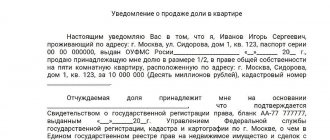Situations often arise when the owner of a share in an apartment shared with family members decides to sell his property. The law allows such a transaction, however, it is not so easy to implement it in practice, since citizens belonging to the category of other homeowners have an initial advantage associated with the acquisition of the remaining square meters. A notarized waiver of the pre-emptive right to purchase can resolve the issue. Having received it from loved ones, you will receive the right to dispose of property without legal restrictions.
Waiver of preemptive right to purchase
Pre-emptive right: what is it?
The term of interest refers to the right that each co-owner of a home has to buy the share that is being sold first, even before the property is put up for sale.
The law prohibits the creation of unbearable financial conditions for relatives who want to purchase a share of real estate, in order to avoid the need to part with residential meters in their favor, and only then sell the square meters to outsiders at acceptable price agreements.
Civil Code of the Russian Federation Article 250. Preemptive right of purchase
Thus, the conditions for notification of price changes are imposed on the citizen selling part of the housing:
- as relatives;
- as well as other possible participants in the transaction.
If you refuse to comply with the requirement, the transaction carried out subsequently will not acquire the status of valid.
The right of first refusal is often abbreviated as “first priority.”
You cannot sell the same share you own at different prices for co-owners and outside buyers, since such prejudice is punishable by law
Rules for selling shares
The law states that you have the right to sell your own share in the apartment to a person of your choice who has sufficient funds to meet your financial requirements and wants to buy a share of the housing. However, the seller must first ensure that the other owners of the property:
- they do not claim this share, and agree to share the space with a stranger;
- do not have the opportunity to purchase your share due to their insufficiently strong financial situation.
Selling a share of housing today is not so easy, since for its trouble-free sale it is necessary to obtain a waiver of the pre-emptive right to purchase of all other co-owners of the residential property
Be that as it may, any reason for refusing to purchase a share must be accompanied by an official renunciation of the priority right given to him by law. It is not enough to say verbally “I refuse,” or to draw up a statement of appropriate content and endorse it with your own signature.
No, you need to seek help from a notary, who will assist in drawing up a waiver in accordance with the law, which will subsequently relieve all parties to the transaction from:
- disputes regarding the legality of the sale;
- other disagreements.
It is not enough to express your consent to the sale of the share out loud; you must go to a notary and, under his supervision, write a statement of appropriate content, which is called a refusal
All issues related to the registration of a refusal, as well as other nuances accompanying it, are regulated by such a regulatory act as the Civil Code of Russia.
The requirement to notarize transactions made regarding shares common to several homeowners came into force only in July 2021, since this method was the only way for the preliminary and final elimination of subsequent disagreements between the parties and mass litigation.
Please note: it happens that co-owners of an apartment constantly live in another city. And sometimes you may even lose contact with them. Therefore, two years ago, adjustments that are still in effect today came into force, according to which an owner who wants to sell his square meters must notify his loved ones about this by posting an advertisement electronically on the website of the state organization that registers the rights of Russians to own real estate.
If you used this method, attach a statement to the package of official papers that other homeowners have been notified of the incident in a similar way.
If you can’t get in touch with other owners of shared housing, place a corresponding announcement on the Rosreestr website. If your relatives do not see it, in this case the law will not prevent the sale
Notification of share sale
Having decided to sell his own share, the person who owns it is obliged to draw up a notice according to the rules for other owners of the apartment, indicating in the text the cost of the area put up for sale.
This document must be drawn up in written form. After completing this task, send the paper by registered mail, not forgetting to order a list of attachments. It, as well as the receipt and subsequent notifications of delivery of documents will further confirm the formalization of consent or refusal of the primary right to purchase, taking into account all legal norms, at least on your part.
The notice in question does not have a set form and is drawn up arbitrarily according to general rules. You can see a sample document in the picture below.
Sample of drawing up a notice of sale of a share
Allocation of square meters
It’s great when the housing documents clearly state the share that belongs to you. For example, you are the owner of one of the rooms with such and such a number of meters.
When the footage is not indicated, but only the ratio relative to the total area of the property is called, in order to draw up a notice and, in principle, conduct a transaction for the sale of property, it is necessary to:
- allocation of a specific area;
- assigning this area to oneself.
This task is carried out through the court. Most often, court officials meet applicants halfway, since the law does not prohibit this. However, remember that the number of meters you own cannot be named arbitrarily; everything must remain within the law.
Provided that space in a communal apartment is being sold, the person who owns part of it will need to send a request to the Federal State Registration Service in order to obtain information about the owners of other premises.
Please note that the extract provided in this case by Rosreestr is paid, and therefore the request itself must be made immediately after payment for this public service.
To make it easier to sell part of the apartment and carry out the procedure for renouncing the priority right, it is necessary to allocate the exact part of your share of housing through the court
Registration of waiver of pre-emptive right to purchase
Citizens who are co-owners of housing, the share of which is about to be sold, having received notification from you, must complete:
- or consent to purchase a share;
- or waiver of the priority right to purchase it.
In the second case, it is necessary, as we have already said, to draw up a refusal with a notary and send it to the owner of the square meters being sold by registered mail.
Please note: each co-owner of the property must submit a waiver. If you need to get it from four people, for example, then you have no right to sell a room after receiving three refusals. Until the required four documents are in hand, the share cannot go on public sale.
The waiver of the priority right to acquire a share must contain the following mandatory information:
- property address;
- a clear indication of the share, either in square meters or as a percentage of the total area of the dwelling;
- the cost of the share in national currency;
- the time period given for making a decision on the preferential purchase of residential meters;
- data of the citizen declaring his unwillingness to buy out the share from the co-owner;
- personal signature of the citizen;
- date of preparation of the document;
- seal of the notary certifying the submitted documentation.
An example of formalizing a refusal to purchase a share of an apartment in common ownership
Validity period for waiver of pre-emptive right to purchase a room
Having made a decision, you are obliged to offer to the co-owners of the property to buy out your own share, however, you should not wait for their decision longer than the period established by law. The period sought is 30 days. It is established at the legislative level, and implies that if you do not receive an answer within the required time frame, you can put a room or other part of your home up for open sale.
If the co-owners have not responded to the sent notifications, then a month after sending them, go to the notary and draw up a certificate that will indicate that:
- you acted within the law and actually sent notifications;
- other homeowners received them and were notified about everything.
So, in order to receive this paper, you need to submit to the notary:
- receipts received at the post office when sending official papers;
- copies of the notifications themselves sent to co-owners;
- notifications of receipt of letters.
As soon as the certificate is issued, the citizen selling part of the apartment can start an official sale of the area, and no longer to relatives.
To obtain a notarized certificate that you notified the co-owners of the property in accordance with all the rules, you need to provide the appropriate package of documents
Small and medium-sized businesses have the right to refuse to purchase leased state property at any time
In December 2007, a lease agreement was concluded between individual entrepreneur Valentina Timoshuk and the Property Relations Committee of St. Petersburg for non-residential premises owned by the city. In November 2015, the entrepreneur applied to the Committee with an application to exercise the pre-emptive right to purchase leased property in accordance with the Law on the specifics of the alienation of real estate in state or municipal ownership (Law No. 159-FZ No. 159 of July 22, 2008 ), establishing the specifics of the alienation of real estate owned by constituent entities of the Russian Federation and municipalities and leased by small and medium-sized businesses.
In December 2015, the government agency established the pre-emptive right of Valentina Timoshuk to acquire the relevant property without bidding and sent her a draft purchase and sale agreement. The price of the property was 10.5 million rubles. This market value was determined on the basis of the assessment report of the St. Petersburg State Unitary Enterprise "City Department of Inventory and Real Estate Valuation", the founder of which is the Property Relations Committee.
The entrepreneur did not sign the received draft contract because she considered the price too high. She reported this to the Property Fund, which, on behalf of the Committee, acted as the seller under this agreement. Then Valentina Timoshuk turned to Expert-Osenka LLC to determine the market value of the rented premises; according to the conclusion, it amounted to 4.1 million rubles.
The entrepreneur suggested that the Property Fund indicate such a redemption price in the contract. However, the organization reported that changing the price was not within its competence, which prompted the entrepreneur to appeal to the arbitration court with a claim to recognize the unreliable value of the market value of real estate and to oblige the Committee to conclude a purchase and sale agreement at the price determined by the court.
In the framework of case No. A56-25899/2016. On March 10, 2021, the Arbitration Court of St. Petersburg and the Leningrad Region terminated the proceedings on the first demand, considering that challenging the value was impossible. However, the Committee obliged the Committee to conclude a purchase and sale agreement for non-residential premises with the entrepreneur at a price of 10.5 million rubles. Two subsequent authorities agreed with him.
In August 2021, the Committee invited the entrepreneur to apply to the Property Fund to draw up the DCT, indicating that from the moment the arbitration court decision entered into legal force, the buyer became obligated to make the first payment. Valentina Timoshuk proceeded from the fact that the contract could not be considered concluded, so in the same month she notified the seller of her refusal to make the first payment.
The Committee, citing the fact that in accordance with paragraph 4 of Art. 445 of the Civil Code, a purchase and sale agreement is considered concluded from the moment the decision in case No. A56-25899/2016 enters into legal force, filed a lawsuit to collect from the entrepreneur more than 1 million in the fine provided for in the agreement for late payment of the first payment (case No. A56- 52992/2018).
AS of St. Petersburg and Leningrad Region, referring to Art. 309, 310, 333, 425, 445, 446, 453, 486 of the Civil Code of the Russian Federation, as well as for the explanations given in paragraphs 71, 73 of the Resolution of the Plenum of the Armed Forces of the Russian Federation of March 24, 2021 No. 7 “On the application by courts of certain provisions of the Civil Code of the Russian Federation on liability for breach of obligations,” came to the conclusion that the claim was justified. The appellate and cassation instances agreed with him.
The courts proceeded from the fact that the decision of March 10, 2021 in case No. A56-25899/2016 entered into legal force on July 24, 2021 and that it resolved the parties’ disagreements regarding the terms of the property purchase and sale agreement in terms of setting the price. Three instances considered that the Committee legitimately demanded the collection of the fine established by the agreement.
The entrepreneur filed a cassation appeal to the Judicial Collegium of the Supreme Court for Economic Disputes, which found it justified. In the Determination of August 29, 2021 No. 307-ES19-3613, the Court recalled that, according to paragraphs 1 and 4 of Art. 421 of the Civil Code, citizens and legal entities are, as a general rule, free to enter into an agreement. The exception is situations when the obligation to conclude an agreement is provided for by law or a voluntarily accepted obligation. In this case, the terms of the agreement are determined at the discretion of the parties, except in cases where the content of the relevant term is prescribed by law or other legal acts.
The Supreme Court drew attention to paragraph 1 of Art. 432 of the Civil Code, which stipulates that an agreement is considered concluded if an agreement is reached between the parties in the required form on all essential terms of the agreement, which are the subject of the agreement and the conditions that are named as such by law or by one of the parties. In this regard, the Supreme Court noted: the entrepreneur did not sign the draft purchase and sale agreement for the premises prepared by the Committee. Moreover, she sent objections regarding the essential term of the contract - the redemption price offered by the seller, and from the moment she received the draft contract until now, she has repeatedly indicated the lack of will to conclude the contract on the terms proposed by the Committee.
The court agreed that in accordance with paragraph 4 of Art. 445 of the Civil Code provides that if a party for whom the conclusion of an agreement is obligatory evades its conclusion, then the other party has the right to apply to the court with a demand to compel the conclusion of an agreement. In this case, the agreement is considered concluded from the moment the relevant court decision enters into legal force and on the conditions specified in it.
Selling without consent
It is possible to sell owned square meters of any housing without obtaining the consent of the owners if they ignored the notifications received.
However, it may be that the co-owners will agree to buy the room. Then you can respond to the notification in a non-official manner (send a letter back, fill out an application, etc.).
It is necessary to begin concluding a purchase and sale agreement as quickly as possible
But what to do if there are many apartment owners and they all expressed a desire to purchase the meters put up for sale? The law provides two legal ways out of the situation.
Table 1. What you can do in a situation where several co-owners want to buy out the space you own
| Method of action | Description |
| One buyer's choice | If it so happens that all the remaining homeowners immediately want to buy out the share, then you have the legal right to independently choose with whom you want to conclude a deal. |
| Proportional division | It is also possible for a situation in which a proportional division of the area is made between the remaining owners of the apartment who have expressed a desire to buy the square meters that belong to you. |
If only one buyer is selected among the owners, or he is the only one who responded to the stated offer, then before signing an agreement with him, it is necessary to officially re-notify the other homeowners about the transaction, who can:
- how to claim the share being sold;
- and not have any claims against her.
However, the notification is for informational purposes only; written consent to the sale will no longer be required in this case.
According to the letter of the law, you can choose the only buyer of the share yourself, or simply distribute it among all co-owners who want to buy it
The law provides for a refund of income tax on the purchase of an apartment in 2021. But you need to know that there are some restrictions on the maximum amount and period of circulation. There are many nuances that are important to know about, as they affect the ability to receive money from the state and the maximum amount. Read more in the special article.
Conducting a sale
Once you have identified the person who will subsequently become the owner of the home, you need to formalize a traditional purchase and sale transaction.
To conclude this according to the rules, you must collect the following documents to accompany the transaction:
- passport;
- property agreement;
- a certificate of absence of debts to the housing and communal services company;
- consent from neighbors, given in writing, that they are not against the procedure being performed;
- an extract from the Unified State Register confirming the right to own a share;
- technical type documentation.
Sample extract from USRN
Also, depending on the situation, you may need to provide these papers:
- marriage certificates;
- statement about the absence of property encumbrances;
- consent of the seller's official couple to sell the share.
Having collected these documents, proceed to drawing up the purchase and sale agreement. In this case, the text contains information about:
- number of meters sold;
- payment procedure for the purchase;
- parties who decided to enter into a transaction.
Real estate purchase and sale agreement
Deal with a minor child
It may be important to know that the transaction discussed in the article can also be concluded with minor Russian citizens. Before reaching 14 years of age, the child’s parents decide on this and also sign for him on the documentation; after 14 years of age, the child can endorse the official acts of sale independently.
Please note: the scheme of interest for the sale of housing seems impossible if permission from the guardianship authorities has not been previously obtained.
However, there is no guarantee that this government agency will give permission. Previously, employees of this official body will be required to make sure that the baby:
- owns a dwelling of similar size to the one being sold;
- will receive funds received from the sale of the share into a personal bank account, and will be able to manage the money after reaching legal age.
It will take the designated government agency 2 weeks to verify these conditions, after which you will receive the appropriate certificate.
According to the law, a transaction can be carried out with a minor child, but on the condition that it is approved by the guardianship and trusteeship authorities, which are obliged to monitor the procedure
Why is notification needed?
The seller must notify his neighbors 1 month before the sale of the room (this is how long the pre-emptive right to real estate lasts). If at the end of this period none of them expresses a desire to buy it, the room may be alienated to other persons who do not have a priority right to purchase it.
Before the Federal Law “On State Registration of Real Estate and Transactions with It” almost completely lost force (by 2020 this will happen to the entire document), an application for the refusal of neighboring owners to purchase was a mandatory written document for the sale of a room. This instruction was contained in Art. 24, which currently has no legal force.
Notifying neighboring owners is an important step before a future sale. According to the law, if the pre-emptive right to buy out a share is violated, the purchase and sale agreement can be appealed in court. Neighbors have 3 months to file a claim from the moment they learned about their preemptive right being violated .
If all owners of a communal apartment waive their right to purchase, it is necessary that they attest in writing to the renunciation and have it notarized. After this, the owner of the room will be able to sell it to other persons without waiting for the end of the one-month period required by law.
Violation of the right of first refusal
Remember, if you violate the rules established by law related to the right of first refusal, the transaction may subsequently be declared invalid and can easily be challenged in court.
More often, problems arise in cases where co-owners of the property are not properly notified about:
- sale of shares;
- the value of the part of the joint property being sold.
Imagine that you haven't received a notification, but you want to buy a share. The law states that you are given another 3 months after you learn about the violation of the legal rights of the owner to return the priority right that belongs to you, even in a situation where the share has already been purchased and is registered in the name of a third-party buyer.
In addition, a transaction that:
- concluded between relatives;
- implied the use of maternity capital funds.
If the rights of minors were violated during the conclusion of the contract, and this was established during further clarification, the transaction is also declared illegal.
Violation of any rules related to the registration of waiver of the pre-emptive right to acquire a share in common property will result in you declaring all concluded transactions invalid
Conclusion
The period during which the waiver of pre-emptive right to purchase, issued by the co-owners of a particular home, is valid, gives a chance to quickly collect papers for the property owned and find a buyer from the outside, by issuing a message about an open sale. But it is worth understanding that if consent is not given by the persons mentioned, then it will be difficult to sell the room, since the buyer will still not be able to live only within its boundaries, and it is often too difficult to establish relationships with other residents.
How to issue a refusal?
How long does the waiver of pre-emptive right to purchase last and does it need to be formalized in writing by a notary? Below are the answers to these questions.
Important nuances
There are two ways for a seller to finally enter into a purchase agreement with a third-party buyer:
- wait a month and calmly sell the room to non-preferred buyers, after making sure that he can prove that he sent a notice to the neighbors;
- receive a written refusal from neighbors in a communal apartment.
The waiver is issued by a notary, which in itself is a paid service, so few neighbors agree to state registration. If the seller was able to convince them of the registration, the neighbors - the preferred buyers - must bring the following documents to the notary:
- passport or other identity document;
- documents evidencing ownership of a room in a communal apartment;
- notification from the seller about the sale of the room.
The refusal itself contains the following information:
- place of compilation and date;
- personal and passport details of the person who refused the purchase;
- seller details;
- information about the property being sold (address, area, etc.);
- price;
- link to article 250 of the Civil Code of the Russian Federation, which allows you to exercise a preemptive right or voluntarily renounce it;
- signature of the refused neighbor;
- signature and seal of the notary.
Its validity period
The effect of the refusal is unlimited in time. The exception is if the seller changes the terms of sale of a room in a communal apartment. In this case, he will have to notify the neighbors again and document the refusal again, or wait a month in silence.










